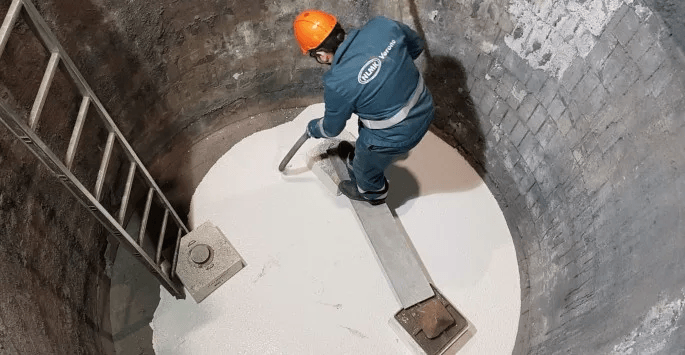API 936 Inspector skills are essential in the world of industrial inspection. These skills ensure safety, quality, and compliance in industries like petrochemicals, refining, and power generation. Whether you are experienced or just starting, this guide will help you excel in this field.
In today’s changing industrial landscape, these refractory knowledge and skills are crucial for safety, quality, and meeting regulations. This guide provides valuable insights to help you succeed in this competitive field.
What Is API 936 Inspector?
API 936 inspector is for individuals who possess the API 936 Inspector certification, demonstrating their expertise in refractory work. These certified inspectors are well-versed in the installation, inspection, testing, and repair of refractory linings.
The API 936 certification not only ensures that there is a skilled workforce ready for the job but also serves as a clear identifier of those who are fully qualified for the task.
What Are The Essential Skills of API 936 Inspector?
To excel in this field, you must acquire and refine a set of essential skills. These skills not only ensure your competence but also establish your credibility as an inspector.
1. Refractory Material Knowledge
A deep understanding of various refractory materials, their properties, and their applications is fundamental. This knowledge enables you to recommend the right materials for specific industrial processes.
2. Inspection Techniques
Proficiency in inspection techniques, such as visual inspections, non-destructive testing (NDT), and thickness measurements, is crucial for detecting defects and assessing refractory conditions.
3. Safety Protocols
Safety takes precedence in industrial environments. API 936 inspectors must be well-versed in safety protocols, including hazard identification and emergency response procedures.
4. Documentation
Accurate and detailed documentation is essential for compliance and decision-making. Inspectors should be skilled in report writing and record-keeping.
5. Problem-Solving
API 936 Inspector Skills must include the ability to identify problems, analyze their root causes, and propose effective solutions. This skill significantly impacts the efficiency of industrial operations.
6. Communication
Effective communication with both technical and non-technical stakeholders is vital. Inspectors must convey inspection findings, recommendations, and safety concerns clearly and professionally.
7. Industry Expertise
An API 936 inspector needs to know industry rules, owner instructions, and project plans well. This is crucial because it helps them do their job properly. Here’s why this knowledge is so important:
What Are The Qualifications of API 936 Inspectors?
Cited from the API 936 standard, it is mentioned that the inspector must not have any business connections with the contractor or manufacturer(s).
An API 936 inspector should not only have a good understanding of the standard, but also the owner’s instructions, the project plan, the inspection and test plan, and any other specific requirements given by the owner, contractor, or manufacturer. The inspector should be familiar with overall documents and requirements.
What Are The Responsibilities of API 936 Inspectors?
In general, the API 936 inspector should:
1. Qualification Documentation
API 936 inspectors must ensure that material and applicator qualification test results are fully documented.
2. Qualification, Production, and Dryout Monitoring
Monitoring qualification, production work, and dry out (when applicable) conducted by the manufacturer(s) and contractor are also needed to be done. It helps ensure compliance with job specifications and agreed-to quality practices.
3. Deficiencies Notifying
It is important for the API 936 inspector to notify the owner and the contractor of any work deficiencies or potential deficiencies. Notification shall be made according to the job-specific requirements outlined in the procedures. Further, notification shall take place as soon as possible. The inspector must also inform within one working day after discovering the deficiency.
4. Installation Procedure Reporting
Another job an API 936 inspector must do is to report the conflicts between the specified execution plan and the actual installation procedures or installed refractory quality results. The report then shall be submitted to the owner for resolution.
5. Hammer Test & Inspection
Inspecting and hammer testing installed linings before dry out and after dry out (when possible), then reporting any anomalies to the owner are required for inspectors.
6. Supervise the Documentation Procedure Done by Contractor
Checking and verifying the accurate installation and dry-out records are being documented in the contractor in by 5.2.8
7. Potential Problems Alerting
It is also important to record all nonconformances and/or potential problems to which the inspector has alerted the contractor and owner
All in all, it is crucial to stress that the API 936 inspector should not make any engineering decisions unless the owner has officially approved them for the project or facility.
FAQs (Frequently Asked Questions)
In general, below are some frequently asked questions related to API 936:
1. What Is API 936 Certification?
API 936 certification is a credential awarded to individuals who demonstrate competence in inspecting refractory materials and installations according to the API 936 standard. It signifies expertise and is highly regarded in industries like petrochemicals and refining.
2. How Can I Become An API 936 Inspector?
To become an API 936 inspector, you typically need relevant education, training, and experience. You’ll also need to pass the API 936 exam certification.
3. What Industries Require API 936 Inspectors?
API 936 inspectors are in demand in industries such as petrochemicals, refining, power generation, and manufacturing, where refractory materials are crucial for safety and efficiency.
4. What Are The Career Prospects for API 936 Inspectors?
API 936 inspectors enjoy promising career prospects, with opportunities for advancement and specialization. The demand for their skills is expected to grow in the coming years.
5. Is API 936 Inspection a Challenging Profession?
Yes, API 936 inspection can be challenging due to the high level of responsibility and the need for continuous learning. However, it can also be highly rewarding both professionally and financially.
6. What Are The Benefits of API 936 Inspector Skills for Industries?
API 936 Inspector Skills help industries maintain safety, quality, and compliance. They lead to cost savings by preventing equipment failures and ensuring regulatory adherence.
API 936 inspector skills are indispensable in today’s industrial landscape. This guide has provided you with a comprehensive understanding of the skills required, industry insights, and answers to common questions. As you embark on your journey in this field, remember that continuous learning and dedication will set you on the path to success.
API 936 inspector skills are vital in today’s industries. This guide has given you a clear understanding of these skills, industry insights, and answers to common questions. As you step into this field, remember that continuous learning and dedication are key to your success.
If you’re looking to boost your API 936 Inspector Skills, consider PetroSync. We provide comprehensive API 936 training that covers practical knowledge for on-the-job use and theoretical knowledge to prepare you for API 936 certification. This API 936 training will equip you with the expertise needed to excel in API 936 inspections and advance your career in industrial quality assurance.
Credit: Springerlink

SEO specialist by day, fact-checker by night. An avid reader and content writer dedicated to delivering accurate and engaging articles through research and credible sources.







